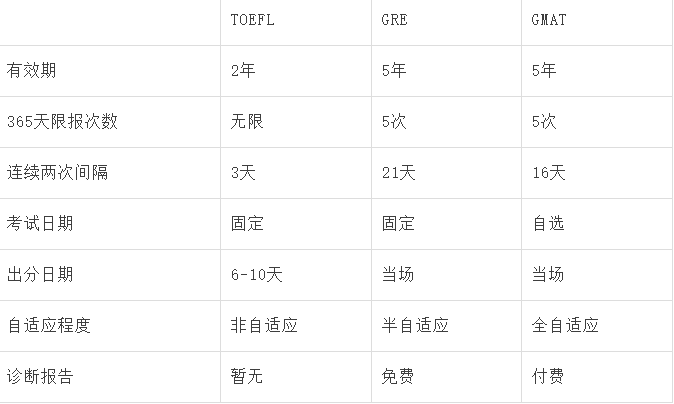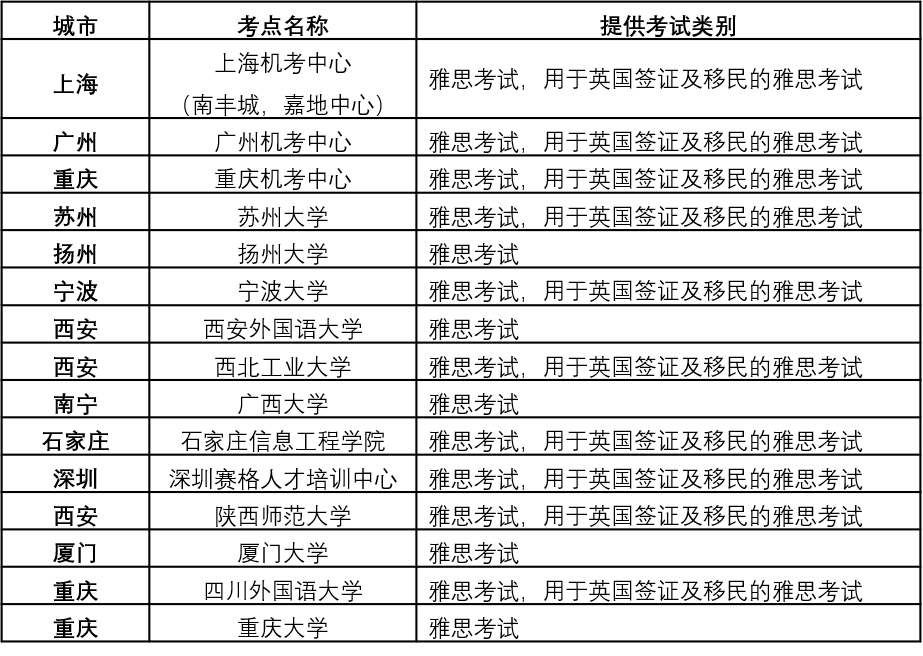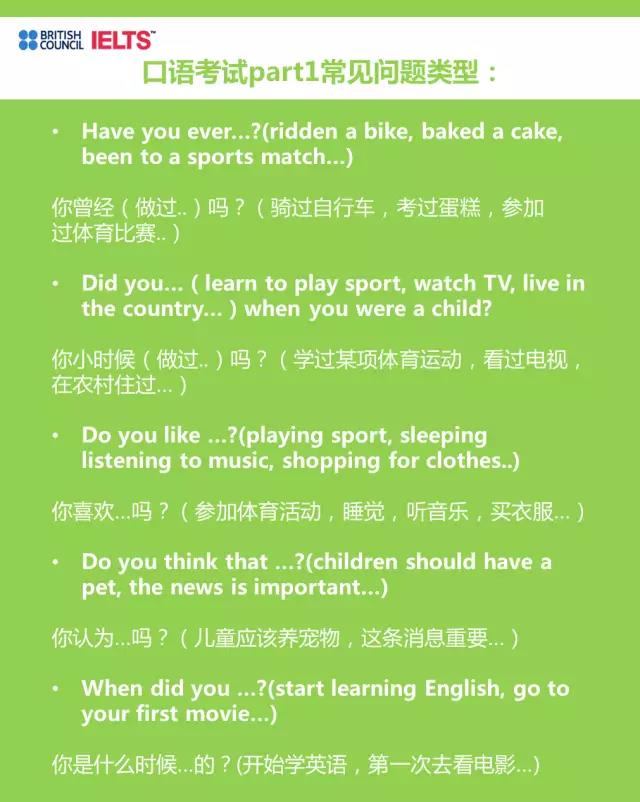精选文章 -->
精选提升托福口语的脱口秀节目 精选托福口语TASK3最强答题攻略 精选托福口语TASK3最强答题攻略 精选扒一扒国内考生常犯的雅思口语错误 精选托福口语能看美剧电影提高吗时间&精力--雅思口语复习投放有技巧!小编今天给大家带来了雅思口语复习投放有技巧,希望能够帮助到大家,下面小编就和大家分享,来欣赏一下吧。
时间&精力--雅思口语复习投放有技巧
自雅思考试设立以来,口试一直是使诸多考生觉得"难"以启齿的一项:一方面,雅思口试的话题范围都非常生活化。从简单的自身学习或工作介绍,到被认为是最难的科学发明、环保,都没有超出日常讨论的范围,也不包括任何专业性的内容,就这点来说,雅思口试和托福TSE或其它同类口试相比,要简单得多;但同时,雅思口语的涉猎面之广,却又使考生在复习时感觉非常棘手。
如果每个话题都要轮着复习过来的话,复习一圈下来在时间和精力上的浪费都堪称huge。可悲的是,哪怕全部复习过了,考试的时候还有可能遇上头脑空白,不知所云的情况;抑或虽然考到了复习的内容,但考试的内容和复习的范围相比,只是冰山之一角,考生为之耗费的时间精力,却如湖面下的冰山,大都湮没于无形,这种复习效率的"性价比"实在太低。
面对时间和精力的双重压力,唯有正确运用复习策略方能运筹于帷幄之中,决胜于千里之外;唯有将复习与应试技巧相结合方能在口试时应对如滔滔江水,连绵不绝。笔者分别就复习时间的把握和精力的投放上作一番探讨,望能助考生在复习的苦海上找到希望的灯塔,在绝望的边缘看到胜利的曙光。
一、复习时间的把握
考生在培训结束到考试的间歇阶段一般应控制在一到二个月左右。间隔短了可能复习不够充分,心理上容易产生紧张焦虑;间隔长了可能出现效率低下、惰性太大的现象,正如背单词强调的"一而作,再而衰,三而竭"的定律,口语复习也应趁热打铁,力求在短期内"直捣黄龙",一举攻破话题重点,在考试之前保持清醒的头脑。
当然,除了整体把握时间之外,还应将复习时间量化,具体落实到每一天。每天考生都应辟出一定的时间进行口头操练,在小时数上应秉持"贪多嚼不烂"的原则,根据个人承受能力选择时间,建议在一到两小时左右。因为口试和其他项目不同,是考生和考官的互动过程,因此在自我演练的时候应该克服自身惰性,按照考试流程做课件和教材上的练习。
考生可根据课件和教材上面的参考答案来评判自身尚存的差距。在答案的评判上应该注意"踩点"原则,将话题的重点作为回答的第一标准,因为这些都将是考试的得分点。
下面我以实例讲述复习时间的拿捏方法。口语话题按照大类可以分为基本情况介绍(如考生的学习和工作、家乡、城市、建筑、爱好、人物、节假日、派对、科技、发明等),而精分一下则可以扩展至大约二十几个。因此如果把复习时间定为一个月三十天,把话题一共cover两遍的话,那么基本上一天复习两个话题足矣。每个话题花一小时左右复习,一天用两小时练口语。
至于针对每个话题的具体操作方法,笔者以"学习"这个话题来具体描述。考生首先应该明确每部分的涉猎范围、出题模式,同时也应按照该话题在三部分的顺序由浅至深地依次回答,答题时可以先自己口头做一遍,再看参考答案和得分点,看到自己离高分答案的尚存差距,有则改之,无则加勉。如果每个话题都能照此方法复习,那么必能熟练掌握口试流程并对每个话题做到在理解上驾轻就熟。
比如涉猎范围和出题模式,在关于"学习"的三部分考题中,第一部分是关于考生的就读专业、专业选择原因以及对课业的好恶等。而第二部分则是对学校的描述、课程的描述等。第三部分更进一步地谈论到社会层面的问题,如谈及教育问题,让你给出建议等。
至于参考答案和得分点,比如看到选择专业的原因,一般参考答案会提及自己对此比较感兴趣,如I enjoy every minute of it,或者说It suits me。虽然理论上讲口语不应该有什么参考答案,但是对基础相对比较薄弱的考生而言,这绝对是能一招制胜且不露痕迹的"葵花宝典"。在短时期能使考生对口试的大致范围做到胸有成竹。
二、精力的投放
为了应付口试中广泛的话题,很多考生在口试的复习过程中一味求全、求多,想尽力cover所有的问题。可是总觉得"野火烧不尽,春风吹又生",一道题未搞定,一道题又侵袭--殊不知,"题海战术"行不通。
其实口语在练习时应注意横着练和竖着练。竖着练是按口试三部分的顺序练。每部分适当地每天选几个题练习可以是三部分选一个话题,也可以三部分分别从各个话题中选出来练习。在上文中举的"学习"一例就是按照竖练来做的。
而横着练则是一项更为重要的复习技巧,也是口试复习的重点。所谓的横着练,是指复习时很有必要注意话题的相通性。如果说生活是一本有章节的书,那么以日常生活作为话题的雅思口试就有很多相互关联的话题。比如说和媒体相关的包括有电视、电影、阅读、音乐、广告等。本来这么多考题对考生来说是一种压力,但如果考生能意识到这些话题的应对有很多相同的地方,那么在答题时一定会进入一个别有洞天的境界。
仍然以媒体为例,口试中有一类描述性的题,如描述某个音乐、某部电影、某本书或是某个广告等等。当然考生会分别使用各种形容词来形容这些对象,但在复习时如果孤立地以每一道题为单位来记忆描述的词汇,就会做大量重复性的工作,因为有些形容词对上述的话题都适用,如impressive, touching等等。可以试着选择一些比较大的词汇,它们往往是"一个扔出来,适用一大片"的回答。
另外再举个例子。很多人在准备口语时往往担心要不要背句型,他们面对句型时总有"句型,要想背你好难"的感受。一方面觉得口语很灵活,没法套句型,另一方面又觉得背不下来。但正如写作要背句型一样,要考好口语最好也能会一点句型,但切记要宁缺毋滥!
比如在第三部分雅思考官往往要你指出目前中国在某个方面最大的某个问题。如谈到人口就是人口太多,环境问题就是吸烟、温室效应或酸雨等。其实无论碰到哪种社会现象或问题,你都能用I'm deeply/strongly concerned about _______这个句型来谈某个问题,表示出你对此的担忧。这就是比较客套、比较合理的一种表达,而不总是盯着worry about, think about这些表达不放,用词显得毫无特色,也没什么地道可言。
因此,如果考生能学会概括话题,尽可能地使用适用面非常广的词或句型,就能大大地节省复习时间,达到事半功倍的效果。相反,考生只会被淹没在题海中不可自拔。
上述两点是对考生备考口试的建议,祝大家复习快乐,口试成功!
雅思口语题库part1话题答案:musical instruments乐器
1. Which musical instrument do you like listening to most? (Why?)
My favourite musical instrument to listen to is the guitar. I like the fact that there are different types of guitar, like classical, acoustic and electric. I love the variety of sounds a guitar can make.
2. Have you ever learned to play a musical instrument?
I took some guitar lessons when I was younger and still have a guitar at home. I don't play it much nowadays. I wish I had more time to practise.
3. Do you think children should learn to play an instrument at school?
Yes, I think it's a great skill and it's really enjoyable to be able to play a musical instrument. All children should be given this opportunity.
4. How easy would it be to learn to play an instrument without a teacher?
It would probably be more difficult without a teacher. You need someone to show you what to do and correct your mistakes. You need a lot of discipline to teach yourself.
相关词汇资料
Musical Genres
classical; jazz; rock and roll; folk; opera; pop; contemporary music
rap; hop-hop; blues; RnB; pop; Kpop; Jpop; heavy metal; punk
Playing Musical Instruments
a soulful singer; a virtuoso musician; a talented pianist; a skilled violinist; learn a musical instrument; practice makes perfect
Listening to Recorded Music
I enjoy listening to some great sounds; I like to chill out listening to music; a classic recording; recorded music; live music; a live album; I listened to an old CD through my headphones
Concerts and Live Music
go to a concert; go to a gig; catch a performance in a concert hall; see a show in a theatre; I prefer live music to recorded music; the venue was just a bar; I once saw the London Symphony Orchestra perform Vivaldi
Songs
a song; a pleasant melody; a catchy tune; a groove; a fast beat; a nice piece of music; an uptempo song; Lennon and McCartney composed this song; Mozart is my favourite composer; I like Beethoven’s symphonies
雅思口语part2话题答案:wait for something to happen
Describe a situation you waited for something to happen.
You should say:
when and where it happened;
what you waited for;
how long you waited for it;
and explain how you felt about waiting.
参考范文:
Ok right then, well after thinking for a little bit just now, what I’ve decided to talk about is the time I waited for a boat at the West Lake in Hangzhou. And as for when this happened, well I suppose it must have been about two or three months ago by now, and it was on a weekend, so we kind of knew that there would be a long queue for the boats!
So yeah, when we got there, we were told that there would be a wait of about an hour or so, at least, which was what we pretty much expected. But we didn’t feel like twiddling our thumbs and hanging around for an hour doing nothing, so instead, what we actually decided to do was to get a ticket number first and then go for a walk around the lake, have lunch and then come back again in the afternoo n. Do it that way!
And I’m glad to say that, when we went back later and showed the guy our ticket, he told us we could get on the next boat. So we felt pretty good about it, and it was quite a relief as well, cos I mean, he could have told us that we missed our turn and would have to get another ticket number, you know, like they do in the bank. But thankfully, he took pity on us, especially after I’d said that we had waited for about 4 hours! So yeah, it all worked out pretty well for us, cos we almost immediately got onto a boat. I’m not sure the other people waiting were very impressed, cos it kind of looked like we were queue barging, but anyway, that’s basically what happened!
So that’s about it, thanks for listening!
亮点词汇:
Queue –队伍 (it can be used as a noun or verb)
Wait – here it is used as a noun
It was what we pretty much expected. – 跟我们想象的差不多一样
twiddling our thumbs – do nothing, 无所作为 (抚弄大拇指)
hanging around -闲呆着
it was quite a relief -令人庆幸,让我们松了一口气
he took pity on us – 他同情了我们
it all worked out pretty well for us - 最终结果不错
queue barging – jumping the queue, 插队
雅思口语part2话题答案:a helpful person in work or study
Descirbe a helpful person in work or study
You should say:
who the person is
what kind of person he/she is
how this person help you
why do you think this person is helpful
参考范文
Ok, so i'd like to talk about a person that i know has done a lot of work to help people, And...this is my grandmother on my father's side. She lived near my childhood home back in the United States and I used to go to her house every, uh, almost every other weekend, umm, because we had a big family and so we'd have lots of events up at my grandparent's house. And, you know, what...what my grandmother did to help people, well, i think there are lots of things...
But one of the main things is that she used to volunteer at a hospital, umm, reaaly often. You know, i was young so i don't know exactly how often she would volunteer but it was definitely a common thing. And i remember my parents talking about this when i was younger and stuff like that. But i really felt it when i was back visiting home one time and i had to visit the hospital for something. And while was waiting a lady come out and talked to me and she said she had known my grandmother and worked with her when she was at the hospital. And that she was always so impressed and really admired, umm, my grandmother and her kindness and how much she gave to the people around her. So that was quite an interesting conversation for me. And i really felt like it was meaningful and my grandmother had been doing meaningful things for the people around her. Um, you know, other than at the hospital of course she took care the people in my family so she would host birthday parties and make lots of different kinds of food and...just always giving to other people so i think she set a really good example in that sense and um, i hope that i'll be able to be a giving and helpful person like she was in the future.
雅思口语题库part1话题答案:letters and emails
1.At work or in your studies, do you often write things?
Yes, I write a lot of emails as part of my job. I work for a company that has offices in several countries, so we use email to communicate.
2.How often do you send e-mails?
I probably write between 5 and 10 work emails every day, and I send emails to friends or family a few times a week.
3.Do you prefer to write by hand or on a computer?
It depends what I’m doing. I prefer the computer for most things because it’s faster and you can save or copy things, but I still like making notes or writing ideas down by hand.
4.Do you prefer to send letters or emails?
I prefer to send emails they’re so much quicker and easier. But then again I suppose letters are more personal and a bit more special. I certainly prefer to receive letters and I guess my real answer is that I get more pleasure out of sending letters too.
5.Do you think computers might one day replace handwriting?
No, I think we will always write by hand as well. I think it’s an important skill, and schools will continue to teach children to write by hand before they learn to type.
扩展语料:写信时的各种礼貌规范用语
Apologizing
I'm sorry about...
I am sorry that...
I'm very sorry about...
I'm very sorry for...
Please forgive me for...
I'd like to apologize for...
Please accept my apologies.
Please accept my sincere apologies. (very formal)
Asking for Help
I'd be grateful if you could...
I would be grateful if you could...
I would appreciate it if you could...
Could you please...
I was wondering of you could help me.(informal)
I would like to know...
Asking for Information
I am writing to enquire about...
I am writing to find out about...
What I am looking for is...
I would like to know about/if...
Closing
I look forward to seeing you.
I look forward to hearing from you.
I look forward to meeting you.
Complaining / expressing dissatisfaction
I'm writing to express my dissatisfaction with...
I'm writing to express my annoyance with...
I am not happy about...
...was very disappointing.
Conveying regards
Please give my best regards to your family.
Please pass on my best wishes to your wife and children.
Please give my regards to your parents.
Expressing satisfaction
I was delighted to hear that...
I was very happy to learn that...
I was thrilled to find out that...
I was glad to hear that...
...was very enjoyable.
Expressing concern / sympathy
I was sorry to hear about... (your accident/ illness)
I am writing to express my concern about...
Giving bad news
I regret to inform you that...(semi-formal)
I am sorry to tell you that...(informal)
I regret to advise you that...(formal)
I am afraid I have some bad news.(informal)
Giving good news
I am pleased to inform you that...(semi-formal)
I am delighted to tell you that...(informal)
I am happy to advise you that...(formal)
I thought you might like to know that...
Giving reasons
This is because...
This is because of...
This is due to... (formal)
This is as a result of...(formal)
This is owing to...(formal)
Making suggestions
Would it be a good idea to...
Perhaps it would be a good idea to...
Thanking
Thanks.
Thank you.
Thank you very much.
Thank you kindly.
I can't thank you enough.
No words can express my gratitude.
I am extremely grateful for...
I very much appreciate your ______ing
雅思口语复习投放时间精力有技巧相关文章:
★ 雅思口语如何正确跟读
上一篇:雅思口语必考话题
下一篇:雅思口语练习之必备表达




